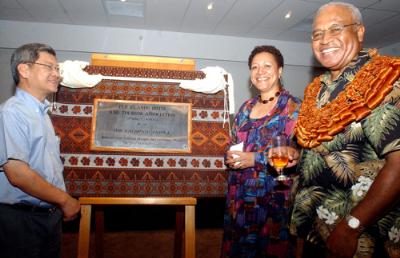
Alcohol test
WHEN Adi Litia Qionibaravi was tested on the night she was stopped by the police, the testing device recorded an alcohol level of 35 micrograms.
During the alcohol test at the station where the reading was converted from micrograms to milligrams, it was found that the figure was two milligrams below the 80ml legal limit (FT 7/2).
I wonder if 35 micrograms is still equivalent to 0.035 milligrams. If it is, then the legal limit would be 2.035mg which is equivalent to 2035micrograms.
I am curious to know how this converted value was two milligrams below the legal limit of 80 ml when the amount of alcohol is in weight measurement while the limit is in volume measurement.
My point is that the formula the police used to justify their action to the case does not look right.
I urge Commissioner Hughes to come clean on this and tell the public the mathematical formula police used in withdrawing charges against prominent people.
Tevita Bevu
Suva
Apparently the reaction to the scathing article on the Driving Under Influence case of the C.E.O for Fijian Affairs Board is rattling the cages of Fiji Police P.R department. This is the usual dismissive attitude from official ranks that only makes a mockery of the intelligence of the greater public.
S.I.F.M recommends the instant dismissal of the incumbent and the institution for simply employing an individual with ill-repute.
Notwithstanding the Fijian Affairs Board's own shortcomings that has chained the Fijian race to an en-trenched feudal system which handicaps their progress in the modern global village.
[For further insight, refer to the Fiji Times Editorial, located at the end of today's posting.]

Fiji Post has been getting side-swiped with their decision to publish the controversial "Cartoon" that has been the cause of riots and embassy razing. S.I.F.M is confident that the same scenario wouldn't be visualized in Fiji.
The similarities of the Protest March cum riot cum Attack, in a Afghanistan N.A.T.O base as was witnessed in Downtown Suva, Fiji at the precise moment the May 2000 coup was being executed.
Fiji Sun contributor and human rights activist, Messr Thakur Ranjit Singh laments his anguish on the New Zealand "Parachute Journalists" who opinionate on the political issue of Fiji. Those who grand-stand as experts in the field, when they hardly understand the local situation.

Finally the Fiji Times Editorial decides to focus on Fiji's land issues. What the editorial fails to point out is that, the archaic Native Lands Trust Board is the root cause for this miserable stagnation of land and mind. Unfortunately the Editorial falls miserably short of real solutions. Typical print-media mentality that uses minimization pre-tense and does not rectify the problems in Fiji.
Land ownershipClub Em Designs
Wednesday, February 08, 2006
IT is a pity that some landowning units claim to be poor yet make no effort at all to utilize their land or allow portions of it to be leased.
It is sad to see so much land lying idle including that which had been previously leased but was taken back by clans after the expiry of leases.
This is evident in the cane belts in Vanua Levu and western Viti Levu and more recently in the dairy farm districts of Tailevu and Naitasiri.
The landowners are not willing to renew the agricultural leases arguing that their members need to utilize the land for commercial or subsistence farming. The excuse is that their numbers are growing and they need the land back.
While the land lies idle, no one, least of all the owners themselves, stand to benefit from it. They do not receive six-monthly rentals from the leases. There is no return because there is no investment. The Government has been too timid in promoting land use among the owners. It fails to convince some landowners of the immense wealth they are missing out on when the land is not utilized. Some of the landowners it has managed to convince eventually lose interest when the markets arranged by the Government for their farm produce fail to materialize.
We have yet to see a government effectively address the land use issue and raise its voice sufficiently to push landowners into getting the maximum returns from their land or making it available for development.
The Government's policy of handouts and special treatment for landowners has to stop. It is not the right way to help them "catch up" with others in lifting their standards of living.
A very few Fijians can honestly claim today that they do not own any tribal land. They have this vital resource which will generate so much for their families if it is utilized. Perhaps through the provincial and district councils they can be educated and counseled on how to benefit from this valuable resource at their disposal.
There used to be by-laws in the Fijian administration system requiring that each male in the village produce a certain quantity of farm produce a month. This was closely monitored and encouraged them to farm the land. Maybe a similar system should be introduced today.
Landowners have to get out of the thinking that they'll lose their precious "God-given" asset if it is leased out or once they use it for farming. They should realize that there are relevant laws in place which safeguard their ownership.
But they must use the land to help themselves, others and the country as a whole.
The wealth they look for is buried in the land. To realize it, the land has to be utilized.
End of story.

No comments:
Post a Comment